英语词汇的来源
英语词汇来源解析
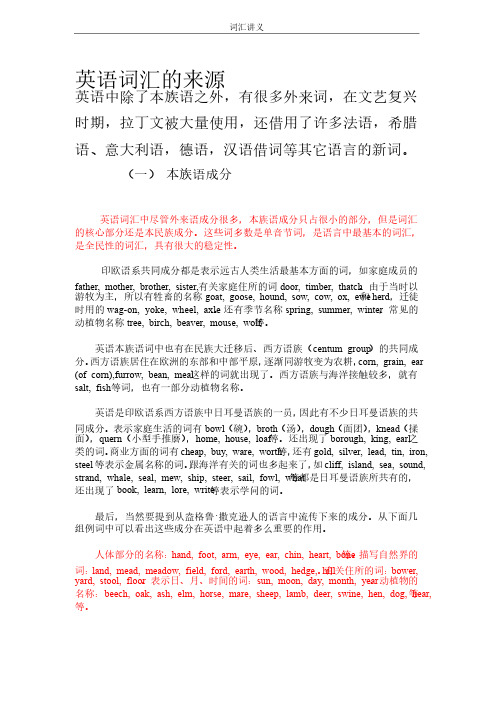
词汇讲义英语词汇的来源英语中除了本族语之外,有很多外来词,在文艺复兴时期,拉丁文被大量使用,还借用了许多法语,希腊语、意大利语,德语,汉语借词等其它语言的新词。
(一)本族语成分英语词汇中尽管外来语成分很多,本族语成分只占很小的部分,但是词汇的核心部分还是本民族成分。
这些词多数是单音节词,是语言中最基本的词汇,是全民性的词汇,具有很大的稳定性。
印欧语系共同成分都是表示远古人类生活最基本方面的词,如家庭成员的father, mother, brother, sister, 有关家庭住所的词有关家庭住所的词door, timber, thatch。
由于当时以和herd,迁徒游牧为主,所以有牲畜的名称goat, goose, hound, sow, cow, ox, ewe,常见的时用的wag-on, yoke, wheel, axle。
还有季节名称spring, summer, winter,常见的动植物名称tree, birch, beaver, mouse, wolf等。
英语本族语词中也有在民族大迁移后、西方语族(centum group)的共同成分。
西方语族居住在欧洲的东部和中部平原,逐渐同游牧变为农耕,corn, grain, ear (of corn),furrow, bean, meal这样的词就出现了。
西方语族与海洋接触较多,就有这样的词就出现了。
西方语族与海洋接触较多,就有salt, fish等词,也有一部分动植物名称。
英语是印欧语系西方语族中日耳曼语族的一员,因此有不少日耳曼语族的共同成分。
表示家庭生活的词有bowl(碗),broth(汤),dough(面团),knead(揉面),quern(小型手推磨),home, house, loaf等。
还出现了borough, king, earl之等,还有gold, silver, lead, tin, iron, 类的词。
商业方面的词有cheap, buy, ware, worth等,steel等表示金属名称的词。
英语词源学
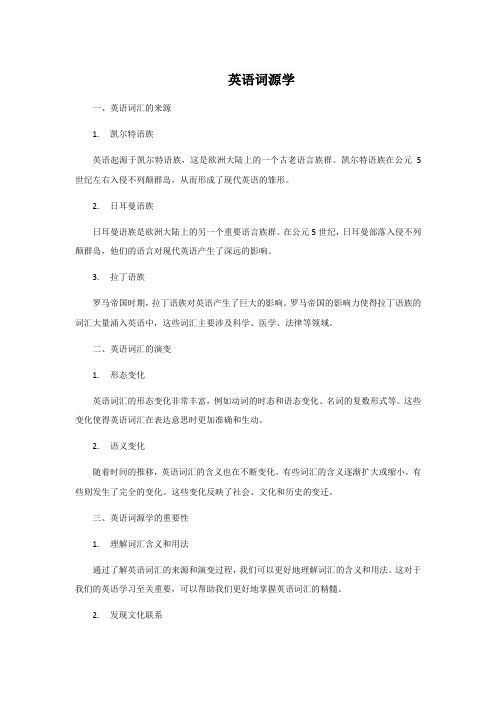
英语词源学一、英语词汇的来源1.凯尔特语族英语起源于凯尔特语族,这是欧洲大陆上的一个古老语言族群。
凯尔特语族在公元5世纪左右入侵不列颠群岛,从而形成了现代英语的雏形。
2.日耳曼语族日耳曼语族是欧洲大陆上的另一个重要语言族群。
在公元5世纪,日耳曼部落入侵不列颠群岛,他们的语言对现代英语产生了深远的影响。
3.拉丁语族罗马帝国时期,拉丁语族对英语产生了巨大的影响。
罗马帝国的影响力使得拉丁语族的词汇大量涌入英语中,这些词汇主要涉及科学、医学、法律等领域。
二、英语词汇的演变1.形态变化英语词汇的形态变化非常丰富,例如动词的时态和语态变化、名词的复数形式等。
这些变化使得英语词汇在表达意思时更加准确和生动。
2.语义变化随着时间的推移,英语词汇的含义也在不断变化。
有些词汇的含义逐渐扩大或缩小,有些则发生了完全的变化。
这些变化反映了社会、文化和历史的变迁。
三、英语词源学的重要性1.理解词汇含义和用法通过了解英语词汇的来源和演变过程,我们可以更好地理解词汇的含义和用法。
这对于我们的英语学习至关重要,可以帮助我们更好地掌握英语词汇的精髓。
2.发现文化联系英语词汇与文化之间有着密切的联系。
通过研究英语词源学,我们可以发现英语词汇与不同文化之间的联系和互动,从而更好地理解英语文化。
3.提高阅读和写作能力掌握英语词源学可以帮助我们提高阅读和写作能力。
在阅读中,我们可以更好地理解文章中出现的生词的含义和用法;在写作中,我们可以运用丰富的词汇表达自己的观点和想法。
总之,英语词源学是一门非常有趣的学科,它可以帮助我们更好地理解英语词汇的含义和用法,发现英语词汇与文化之间的联系,提高我们的阅读和写作能力。
通过学习这门学科,我们可以深入探索英语词汇背后的故事,感受不同文化之间的交流与融合。
194个英语词汇起源及巧记的方法1
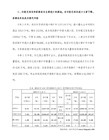
20、Museum博物馆这个词来源于希腊词Museion;意思是"谬斯神庙"。谬斯(the Muses)是主管音乐、诗歌、舞蹈、天文等九位女神的总称。他们喜居于希腊南帕那萨斯山脚下以及赫利孔山上的名泉之中。因此,至今仍有fountain of knowledge(知识的源泉),springs of inspiration(灵感的源泉)的说法。出于对谬斯女神们的敬仰,古希腊人把艺术作品以及自然科学方面的物品放置在谬斯神庙,即mouseion里面。
Anthropology一词最早出现在古希腊哲学家亚里士多德的着作里;不过当时没有"人类学"的含义,而是指如何"对待人类"。
15、Rostrum讲台
这个词现代英语里作"讲坛","演讲台","检阅台"等解,"(天安门)城楼"也用它,即the Tien An Men Rostrum。你也许想象不到,rostrum的原义竟是"鸟喙"!但了解一下这个词演变的历史,你就会觉得从"鸟喙"到"讲台"并非不合乎逻辑。
和school密切相关的还有一个词:scholar(学者)。同样道理,这个词是指那些有"闲暇"时间读书、研究,构思以及进行学术讨论的人。
9、Education教育
教育,就是启发、引导、培养新一代。学校的教师是最主要的教育工作者,他们的工作就是把学生内在的天资,能力引导出来。启发出来,而这样一个过程也就是"教育"。英语educate一词的原始含义恰也是如此。这个词是从拉丁语来的e-即"out";duco- "lead",合起来就是lead out(引导出来,启发)。
英语外来词词源及故事

英语外来词词源及故事英语作为一门世界语言,其词汇丰富且多样,其中外来词占据了重要地位。
外来词是指从其他语言借用而来的词汇,这些词汇丰富了英语的表达方式,使之更加生动和具有表现力。
本文将探讨英语外来词的来源、影响及学习策略。
一、英语外来词概述英语外来词是指在英语语言发展过程中,从其他语言中借用并融入英语词汇体系的词汇。
这些词汇在英语中具有与其他词汇相同的地位和功能,只是它们的起源并非英语本身。
二、英语外来词的分类与来源1.欧洲语言来源:英语与欧洲其他语言(如法语、德语、西班牙语等)有较深的渊源,许多外来词来源于这些语言。
如:automobile(汽车)源自法语,vandalism(破坏公物)源自德语。
2.非洲语言来源:英语也受到了非洲语言的影响,如:banana(香蕉)源自非洲土著语言。
3.亚洲语言来源:随着全球交流的扩大,越来越多的亚洲语言词汇进入英语,如:karaoke(卡拉OK)源自日语,sushi(寿司)源自日语。
4.阿拉伯语来源:阿拉伯语对英语的影响主要体现在学术和科技领域,如:alchemy(炼金术)源自阿拉伯语,algorithm(算法)源自阿拉伯语。
5.法语来源:法语是英语中最重要的外来语来源之一,如:couture(高级定制)源自法语,bureau(办公桌)源自法语。
6.拉丁语来源:许多医学、生物学和学术领域的词汇来源于拉丁语,如:encyclopedia(百科全书)源自拉丁语,symphony(交响乐)源自拉丁语。
三、英语外来词的影响与意义英语外来词丰富了英语的表达方式,使英语成为一门具有广泛影响力的世界语言。
这些词汇的引入,使英语变得更加生动、形象和具有表现力,同时也反映了世界各地文化的交流与融合。
四、英语学习中的外来词应对策略1.了解外来词的来源和背景,加深对英语单词的理解。
2.积累常用外来词,提高自己的英语词汇量。
3.学习外来词的用法,注意其在不同语境下的表达效果。
五、总结英语外来词是英语词汇体系中不可或缺的一部分,它们丰富了英语的表达方式,展示了世界各地文化的交融。
现代英语词汇的演变和发展
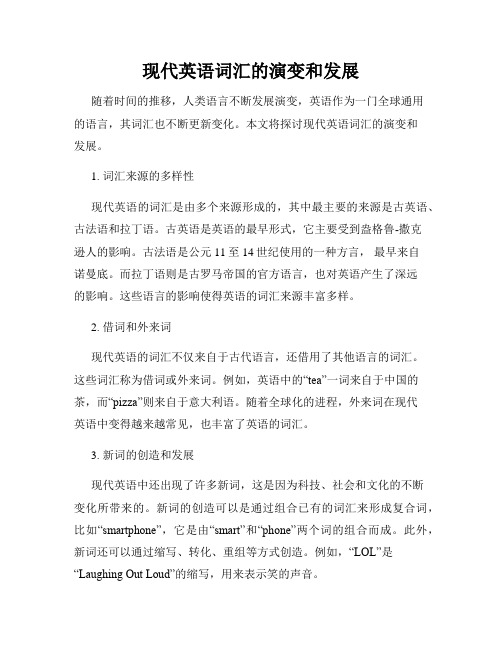
现代英语词汇的演变和发展随着时间的推移,人类语言不断发展演变,英语作为一门全球通用的语言,其词汇也不断更新变化。
本文将探讨现代英语词汇的演变和发展。
1. 词汇来源的多样性现代英语的词汇是由多个来源形成的,其中最主要的来源是古英语、古法语和拉丁语。
古英语是英语的最早形式,它主要受到盎格鲁-撒克逊人的影响。
古法语是公元11至14世纪使用的一种方言,最早来自诺曼底。
而拉丁语则是古罗马帝国的官方语言,也对英语产生了深远的影响。
这些语言的影响使得英语的词汇来源丰富多样。
2. 借词和外来词现代英语的词汇不仅来自于古代语言,还借用了其他语言的词汇。
这些词汇称为借词或外来词。
例如,英语中的“tea”一词来自于中国的茶,而“pizza”则来自于意大利语。
随着全球化的进程,外来词在现代英语中变得越来越常见,也丰富了英语的词汇。
3. 新词的创造和发展现代英语中还出现了许多新词,这是因为科技、社会和文化的不断变化所带来的。
新词的创造可以是通过组合已有的词汇来形成复合词,比如“smartphone”,它是由“smart”和“phone”两个词的组合而成。
此外,新词还可以通过缩写、转化、重组等方式创造。
例如,“LOL”是“Laughing Out Loud”的缩写,用来表示笑的声音。
4. 网络和社交媒体对词汇的影响随着互联网和社交媒体的兴起,新兴词汇在现代英语中变得越来越普遍。
网络用语和社交媒体术语的使用对英语词汇的发展产生了巨大影响。
例如,“selfie”就是近年来出现的一个词汇,它形容的是自拍照片。
这些新的词汇和短语的出现使得英语变得更加充满活力。
总之,现代英语词汇的演变和发展是一个不断变化的过程。
不同的语言和文化的影响,新词的创造和社交媒体的出现都对英语词汇的多样性和丰富性产生了影响。
人们对现代英语词汇的了解可以帮助我们更好地理解和使用这一全球通用的语言。
英语单词的起源和历史

英语单词的起源和历史英语单词的起源和历史可以追溯到数千年前,经历了多个阶段的发展。
本文将简要介绍英语单词的起源、发展及其历史演变。
1. 盎格鲁-撒克逊时期(公元5-11世纪)英语的最早起源可以追溯到公元5世纪,当时盎格鲁-撒克逊人来到大不列颠岛,带来了他们的语言——古英语。
古英语是一种日耳曼语,与荷兰语、德语等有密切关系。
在这个阶段,英语词汇相对简单,主要涉及日常生活中的事物和自然现象。
2. 诺曼征服时期(公元11世纪)公元11世纪,诺曼人征服了法国北部的诺曼底地区。
他们的语言——古法语,对英语产生了深远的影响。
随着诺曼人征服英国,古法语成为统治阶级的语言,大量法语词汇进入英语,使得英语词汇变得更加丰富。
3. 中世纪英语(公元11-15世纪)在这一阶段,英语逐渐演变为中世纪英语。
随着文学作品的兴起,尤其是莎士比亚戏剧的出现,英语开始变得更加规范。
此外,由于与欧洲其他国家的交流日益密切,英语吸收了大量拉丁语和希腊语词汇。
4. 近代英语(公元16-18世纪)公元16世纪,英语开始进入近代阶段。
这一时期的英语以英王詹姆斯钦定的《圣经》英译本和莎士比亚戏剧为代表。
在此阶段,英语的词汇和语法结构发生了巨大变化,逐渐形成了现代英语的雏形。
5. 现代英语(公元19世纪至今)从19世纪开始,英语的书面语与现在我们所看到的基本上一致。
随着英国殖民地的扩张,英语吸收了来自其他语言的众多词汇,使得英语词汇更加丰富。
此外,科学技术的飞速发展、全球化进程的加速以及互联网的普及,都为英语词汇的拓展创造了条件。
总结:英语单词的起源和历史经历了古英语、中世纪英语、近代英语和现代英语四个阶段。
在这个过程中,英语不断吸收其他语言的词汇,逐步发展成为全球最通用的语言之一。
如今,英语词汇丰富多样,蕴含着世界各地的文化和知识。
了解英语单词的起源和历史,有助于我们更好地学习和使用这一世界语言。
英语词源单词
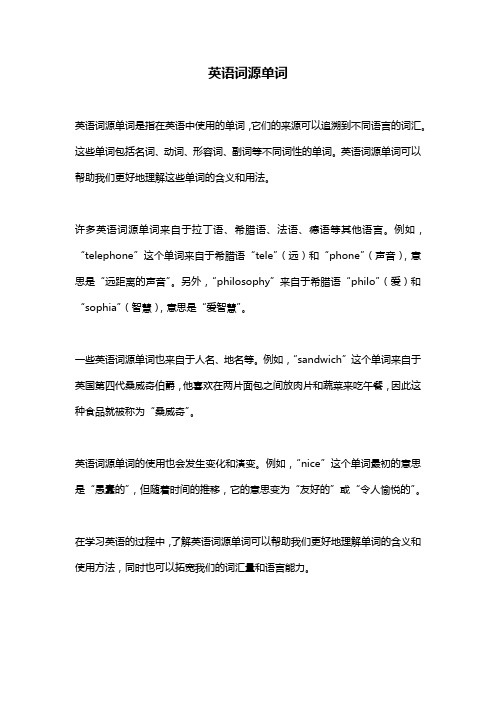
英语词源单词
英语词源单词是指在英语中使用的单词,它们的来源可以追溯到不同语言的词汇。
这些单词包括名词、动词、形容词、副词等不同词性的单词。
英语词源单词可以帮助我们更好地理解这些单词的含义和用法。
许多英语词源单词来自于拉丁语、希腊语、法语、德语等其他语言。
例如,“telephone”这个单词来自于希腊语“tele”(远)和“phone”(声音),意思是“远距离的声音”。
另外,“philosophy”来自于希腊语“philo”(爱)和“sophia”(智慧),意思是“爱智慧”。
一些英语词源单词也来自于人名、地名等。
例如,“sandwich”这个单词来自于英国第四代桑威奇伯爵,他喜欢在两片面包之间放肉片和蔬菜来吃午餐,因此这种食品就被称为“桑威奇”。
英语词源单词的使用也会发生变化和演变。
例如,“nice”这个单词最初的意思是“愚蠢的”,但随着时间的推移,它的意思变为“友好的”或“令人愉悦的”。
在学习英语的过程中,了解英语词源单词可以帮助我们更好地理解单词的含义和使用方法,同时也可以拓宽我们的词汇量和语言能力。
现代汉语中英语外来词探析

参考内容
在现代汉语中,英语外来词的存在和影响不容忽视。这些外来词的引入,不 仅丰富了汉语词汇,也为我们提供了更广泛的思想和交流工具。本次演示将从历 史背景、外来词类型、影响及未来展望等方面对现代汉语中的英语外来词进行深 入探讨。
一、历史背景
自19世纪以来,随着中西方文化交流的不断加深,大量英语词汇开始进入汉 语。最初的进入主要集中在科学、技术、政治等领域。例如,“”、“电脑”、 “民主”等都是这一时期的代表。20世纪后期,随着全球化的加速和互联网的普 及,英语外来词的数量和范围进一步扩大,涉及到社会、经济、娱乐等各个领域。
3、对汉字书写和规范产生一定 影响
随着英语外来词的不断涌入,一些汉字的原有书写方式被改变,甚至出现了 一些不规范的汉字组合和书写方式。这在一定程度上影响了汉字书写的规范性和 美观度。
四、英语外来词的规范化问题
为了维护汉字的规范性和纯洁性,需要对英语外来词进行规范化处理。具体 来说,可以从以下几个方面入手:
1、确定规范化的原则和方法
应明确规定英语外来词的借用方式和规范化原则,明确规定哪些类型的英语 词汇可以借用、哪些不能借用,以及借用时应遵守的书写和发音规范。
2、建立专门的英语外来词词典
可以编写专门的英语外来词词典,方便人们查询和学习规范的英语外来词。 此外,还可以为词典中的每个单词提供相应的英文原文和注释,帮助人们更好地 了解和掌握这些词汇。
四、未来展望
随着全球化的不断深入和互联网的普及,英语外来词在未来还将继续进入汉 语。我们应当持开放和包容的态度,谨慎选择和引入英语外来词,以适应时代的 发展和社会的需求。我们也应该加强对英语外来词的研究和教育,使人们能够更 准确、更恰当地理解和使用这些词汇。
总结:现代汉语中的英语外来词是中西方文化交流的重要组成部分。它们丰 富了汉语词汇,为我们的表达提供了更多选择。我们应该持开放和包容的态度, 加强对英语外来词的研究和教育,以适应时代的发展和社会的需求。
英语词汇及词根的来源
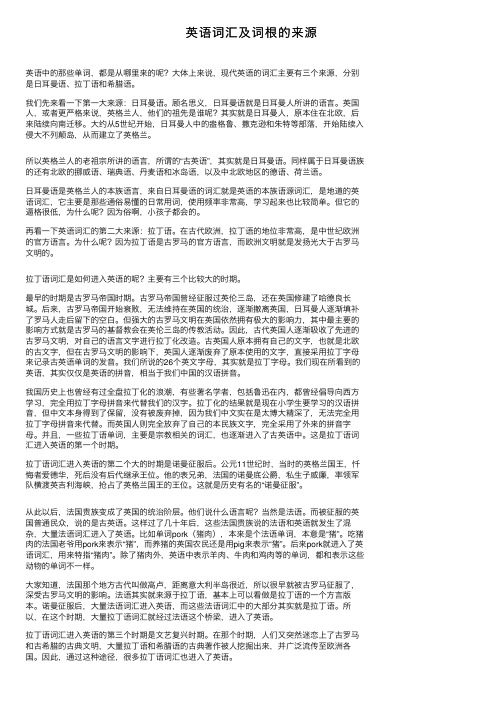
英语词汇及词根的来源英语中的那些单词,都是从哪⾥来的呢?⼤体上来说,现代英语的词汇主要有三个来源,分别是⽇⽿曼语、拉丁语和希腊语。
我们先来看⼀下第⼀⼤来源:⽇⽿曼语。
顾名思义,⽇⽿曼语就是⽇⽿曼⼈所讲的语⾔。
英国⼈,或者更严格来说,英格兰⼈,他们的祖先是谁呢?其实就是⽇⽿曼⼈,原本住在北欧,后来陆续向南迁移。
⼤约从5世纪开始,⽇⽿曼⼈中的盎格鲁、撒克逊和朱特等部落,开始陆续⼊侵⼤不列颠岛,从⽽建⽴了英格兰。
所以英格兰⼈的⽼祖宗所讲的语⾔,所谓的“古英语”,其实就是⽇⽿曼语。
同样属于⽇⽿曼语族的还有北欧的挪威语、瑞典语、丹麦语和冰岛语,以及中北欧地区的德语、荷兰语。
⽇⽿曼语是英格兰⼈的本族语⾔,来⾃⽇⽿曼语的词汇就是英语的本族语源词汇,是地道的英语词汇,它主要是那些通俗易懂的⽇常⽤词,使⽤频率⾮常⾼,学习起来也⽐较简单。
但它的逼格很低,为什么呢?因为俗啊,⼩孩⼦都会的。
再看⼀下英语词汇的第⼆⼤来源:拉丁语。
在古代欧洲,拉丁语的地位⾮常⾼,是中世纪欧洲的官⽅语⾔。
为什么呢?因为拉丁语是古罗马的官⽅语⾔,⽽欧洲⽂明就是发扬光⼤于古罗马⽂明的。
拉丁语词汇是如何进⼊英语的呢?主要有三个⽐较⼤的时期。
最早的时期是古罗马帝国时期。
古罗马帝国曾经征服过英伦三岛,还在英国修建了哈德良长城。
后来,古罗马帝国开始衰败,⽆法维持在英国的统治,逐渐撤离英国,⽇⽿曼⼈逐渐填补了罗马⼈⾛后留下的空⽩。
但强⼤的古罗马⽂明在英国依然拥有极⼤的影响⼒,其中最主要的影响⽅式就是古罗马的基督教会在英伦三岛的传教活动。
因此,古代英国⼈逐渐吸收了先进的古罗马⽂明,对⾃⼰的语⾔⽂字进⾏拉丁化改造。
古英国⼈原本拥有⾃⼰的⽂字,也就是北欧的古⽂字,但在古罗马⽂明的影响下,英国⼈逐渐废弃了原本使⽤的⽂字,直接采⽤拉丁字母来记录古英语单词的发⾳。
我们所说的26个英⽂字母,其实就是拉丁字母。
我们现在所看到的英语,其实仅仅是英语的拼⾳,相当于我们中国的汉语拼⾳。
英语外来词词源及故事
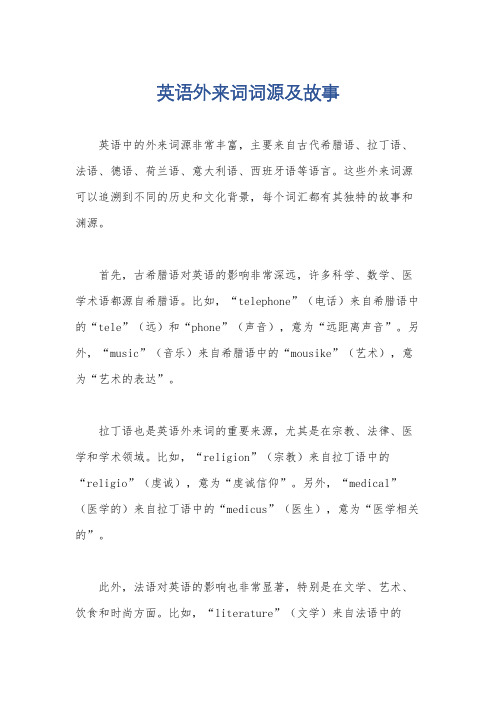
英语外来词词源及故事
英语中的外来词源非常丰富,主要来自古代希腊语、拉丁语、法语、德语、荷兰语、意大利语、西班牙语等语言。
这些外来词源可以追溯到不同的历史和文化背景,每个词汇都有其独特的故事和渊源。
首先,古希腊语对英语的影响非常深远,许多科学、数学、医学术语都源自希腊语。
比如,“telephone”(电话)来自希腊语中的“tele”(远)和“phone”(声音),意为“远距离声音”。
另外,“music”(音乐)来自希腊语中的“mousike”(艺术),意为“艺术的表达”。
拉丁语也是英语外来词的重要来源,尤其是在宗教、法律、医学和学术领域。
比如,“religion”(宗教)来自拉丁语中的“religio”(虔诚),意为“虔诚信仰”。
另外,“medical”(医学的)来自拉丁语中的“medicus”(医生),意为“医学相关的”。
此外,法语对英语的影响也非常显著,特别是在文学、艺术、饮食和时尚方面。
比如,“literature”(文学)来自法语中的
“littérature”,意为“文字作品”。
另外,“restaurant”(餐馆)来自法语中的“restaurant”,意为“恢复体力”。
除了以上这些语言,德语、荷兰语、意大利语、西班牙语等语言也对英语的外来词汇产生了影响。
比如,“kindergarten”(幼儿园)来自德语中的“Kindergarten”,意为“儿童园地”。
总的来说,英语中的外来词源广泛而丰富,每个词汇都蕴含着丰富的历史和文化内涵。
通过了解这些词源及其故事,我们可以更好地理解和使用英语词汇,也能更好地欣赏不同文化间的交流与融合。
英语词汇的起源

英语词汇的起源
英语词汇的起源可以追溯到很久以前的历史时期。
英语属于印欧语系的日耳曼语支,其词汇主要来源于以下几个方面:
1. 古日耳曼语:英语最早的形式可以追溯到古日耳曼语,这是一种在公元前1千年到公元4世纪之间使用的语言。
古日耳曼语的词汇主要来自原始印欧语和原始日耳曼语。
2. 拉丁语:在罗马帝国的统治下,拉丁语对英语的词汇产生了重要影响。
许多拉丁语词汇被借用到英语中,尤其是在宗教、法律、科学和医学方面。
3. 古法语:在中世纪,诺曼底人征服英格兰,将古法语作为统治者和贵族的语言。
因此,许多古法语词汇也被引入到英语中,特别是在法律、政府和领导层方面。
4. 古斯堪的纳维亚语:古斯堪的纳维亚语是古代北欧的语言,如古挪威语和古丹麦语。
由于维京人的袭击和定居活动,一些古斯堪的纳维亚语的词汇也被引入到英语中。
5. 古英语:古英语是约从公元5世纪到公元11世纪使用的形式。
在这个时期,一些日耳曼部落包括盎格鲁-撒克逊人和朱
特人定居在不列颠群岛,并对古英语的形成产生了影响。
总而言之,英语词汇的起源可以追溯到原始印欧语,并受到古日耳曼语、拉丁语、古法语和古斯堪的纳维亚语等语言的影响。
随着历史的演变,英语词汇不断发展壮大,形成了现代英语的丰富词汇体系。
常见的英语外来词的词源及其故事

常见的英语外来词的词源及其故事(最新版3篇)篇1 目录I.英语外来词的来源1.直接借词2.混合词3.音译词4.外来语II.英语外来词的故事1.直接借词的故事2.混合词的故事3.音译词的故事4.外来语的故事篇1正文一、英语外来词的来源1.直接借词:这类外来词是最直接地从其他语言中借取而来,没有经过任何翻译或转换。
例如,“沙发”源自法语“sofa”,“酒吧”源自英语“bar”。
2.混合词:这类外来词是由两个或更多的语言元素混合而成。
例如,“朋克”源自英语“punk”和德语“朋克”,“卡路里”源自法语“calorie”和西班牙语“calorías”。
3.音译词:这类外来词是根据原始语言的发音,在目标语言中创建一个新的词汇。
例如,“芭比”源自英语“Barbie”,“达芬奇”源自意大利语“Leonardo da Vinci”。
4.外来语:这类外来词是从其他语言中借取,但经过了翻译或转换。
例如,“菜单”源自法语“menu”,“共产主义”源自俄语“communism”。
二、英语外来词的故事1.直接借词的故事:许多直接借词反映了历史事件或文化潮流。
例如,“摇滚”源自英语“rock and roll”,反映了20世纪50年代的音乐潮流。
“朋克”源自英语“punk”,反映了20世纪70年代的文化运动。
2.混合词的故事:混合词展示了不同语言元素的融合,以及人们对新词汇的需求。
篇2 目录I.英语外来词的来源1.直接借用其他语言词汇2.音译其他语言词汇3.意译其他语言词汇II.英语外来词的影响1.文化交流2.语言创新3.语言规范篇2正文随着全球化的进程加快,英语作为全球通用语言的地位日益稳固。
在英语的使用中,外来词的引入也变得越来越普遍。
这些外来词通常源自其他语言,包括法语、德语、西班牙语、中文等。
这些外来词的引入不仅丰富了英语词汇,也反映了全球文化交流的多样性。
一、直接借用其他语言词汇英语外来词中的一部分是通过直接借用其他语言词汇的方式引入的。
194个英语词汇起源

194个英语词汇起源1、Chemistry化学古代的炼金术士们总想找到一种方法,将低贱的金属变为金子。
现在通过原子裂变的原理表明,他们的这种想法并非一般人们想象的那么愚蠢。
古埃及人入侵欧洲后,将他们所研究的炼金术,连同其命名al-kimia一起传入欧洲。
后来,这个词变成alchemy,"炼金的人"叫做alchemist,最后成了chemistry,"化学"的概念就是从"炼金术"演变来的。
2、Geology地质学"地质学"是研究形成地球的物质和地壳构造,以探讨地球的形成和发展的科学。
Geology 是从希腊语来的,ge即"earth";-ology,"science",即研究地球本身的科学。
3、Law法律"法律"是立法机关制定的、国家政权保证执行的行为规则。
Law在古英语中写作lagu,意即"something laid down(规定下来的事情)"。
4、Electricity电古希腊人常用琥珀制作爱情护符,确信戴着这种护符的人可以引来爱人。
他们发现,磨擦琥珀可以吸引羽毛、线头等小东西,磨擦时会放出火花。
他们就把这种磨擦起电的现象叫做elektron。
来自希腊语elektor,意即"发光的太阳",进入拉丁语后写作electrum。
英语演变为electricity。
5、Atom原子古希腊人认为,特质是不可能无限止地分割下去的,越分越小,最后小到不可再分。
他们把"原子"叫做atomos:a即"not";tomos,"cut"意即"不能再分割"以后这个词在英语中演变为atom。
尽管后来发现"原子"并非"不可再分割",然而约定俗成,"原子"的名字仍然以atom 流传下来。
单词的历史英语词源漫谈

单词的历史英语词源漫谈一、引言英语作为世界上最广泛使用的语言之一,其词汇的起源和发展历史悠久且多样。
从古代英语到现代英语,词汇的演变经历了许多阶段,反映了社会、文化和历史的变迁。
本文将探讨英语词汇的历史和词源,以帮助我们更好地理解英语的发展和演变。
二、古代英语时期古代英语时期指的是公元450年至1150年左右的时期。
在这个时期,英语词汇主要是由日耳曼语族中的盎格鲁-撒克逊语演变而来。
随着罗马帝国的衰落,日耳曼部落开始迁徙到不列颠群岛,并在那里定居。
这些部落带来了自己的语言,即盎格鲁-撒克逊语,它是现代英语的直接前身。
三、中世纪英语时期中世纪英语时期指的是公元1150年至1500年左右的时期。
在这个时期,英语受到了拉丁语、法语和诺尔斯语的影响,词汇和语法发生了显著变化。
例如,“knight”(骑士)一词来源于法语,“parliament”(议会)一词来源于拉丁语。
此外,中世纪英语还出现了许多新词汇,以描述新事物和概念,例如“gunpowder”(火药)和“compass”(指南针)。
四、文艺复兴与早期现代英语文艺复兴与早期现代英语时期指的是公元1500年至1800年左右的时期。
在这个时期,英语逐渐发展成为全球重要的语言之一。
随着英国在全球的扩张和贸易的增加,许多新词汇被引入到英语中。
例如,“tea”(茶)、“coffee”(咖啡)和“chocolate”(巧克力)等词汇都源自这个时期。
此外,这个时期的英语也经历了重大的语法和词汇变化,例如动词时态和语态的变化。
五、现代英语时期现代英语时期指的是公元1800年至今的时期。
在这个时期,英语在全球的影响力进一步扩大,成为国际交流的主要语言之一。
随着科技的发展和社会的进步,许多新词汇被创造出来,例如“email”(电子邮件)、“smartphone”(智能手机)和“internet”(互联网)等。
此外,全球化和国际交流的增加也导致了英语中出现更多的外来词和借词。
英语词汇起源
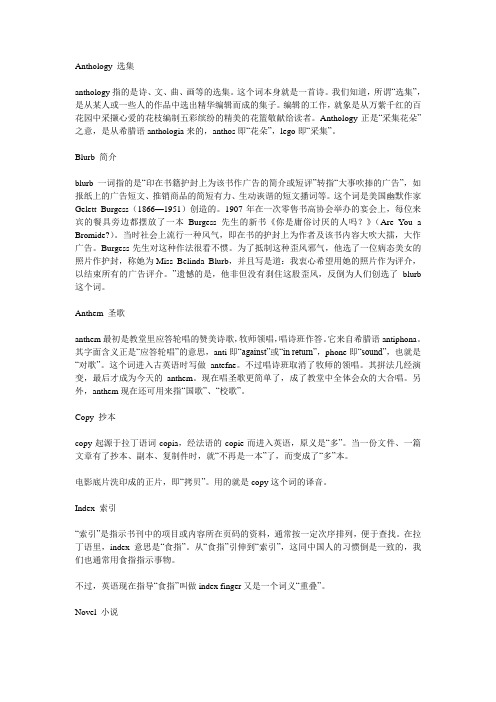
Anthology 选集anthology指的是诗、文、曲、画等的选集。
这个词本身就是一首诗。
我们知道,所谓“选集”,是从某人或一些人的作品中选出精华编辑而成的集子。
编辑的工作,就象是从万紫千红的百花园中采撷心爱的花枝编制五彩缤纷的精美的花篮敬献给读者。
Anthology正是“采集花朵”之意,是从希腊语anthologia来的,anthos即“花朵”,lego即“采集”。
Blurb 简介blurb一词指的是“印在书籍护封上为该书作广告的简介或短评”转指“大事吹捧的广告”,如报纸上的广告短文、推销商品的简短有力、生动诙谐的短文播词等。
这个词是美国幽默作家Gelett Burgess(1866—1951)创造的。
1907年在一次零售书高协会举办的宴会上,每位来宾的餐具旁边都摆放了一本Burgess先生的新书《你是庸俗讨厌的人吗?》(Are You a Bromide?)。
当时社会上流行一种风气,即在书的护封上为作者及该书内容大吹大擂,大作广告。
Burgess先生对这种作法很看不惯。
为了抵制这种歪风邪气,他选了一位病态美女的照片作护封,称她为Miss Belinda Blurb,并且写是道:我衷心希望用她的照片作为评介,以结束所有的广告评介。
”遗憾的是,他非但没有刹住这股歪风,反倒为人们创选了blurb 这个词。
Anthem 圣歌anthem最初是教堂里应答轮唱的赞美诗歌,牧师领唱,唱诗班作答。
它来自希腊语antiphona。
其字面含义正是“应答轮唱”的意思,anti即“against”或“in return”,phone即“sound”,也就是“对歌”。
这个词进入古英语时写做antefne。
不过唱诗班取消了牧师的领唱。
其拼法几经演变,最后才成为今天的anthem。
现在唱圣歌更简单了,成了教堂中全体会众的大合唱。
另外,anthem现在还可用来指“国歌”、“校歌”。
Copy 抄本copy起源于拉丁语词copia,经法语的copie而进入英语,原义是“多”。
英语词汇奥秘

英语词汇奥秘
英语词汇奥秘
英语是世界上使用最为广泛的语言之一,拥有丰富而多样的词汇。
每个词汇都承载着丰富的历史和文化内涵,揭示着人类语言发展的奥秘。
首先,英语词汇的奥秘在于它的起源。
英语的词汇有着多个来源,其中最主要的是拉丁语和古英语。
拉丁语是古罗马帝国的语言,影响了许多欧洲国家的语言,包括英语。
许多英语词汇,尤其是科学和学术领域的词汇,都来自拉丁语。
古英语则是英语的前身,它的词汇包括了很多描述自然、动物和生活的词汇。
通过了解英语词汇的起源,我们可以更好地理解词汇的含义和使用。
其次,英语词汇的奥秘在于它的多样性。
英语词汇取自各种不同的语言,包括法语、德语、荷兰语、意大利语等。
这些词汇的多样性使得英语成为一个非常灵活的语言,能够表达各种不同的意思和概念。
通过学习和掌握这些多样的词汇,我们可以更加准确地表达自己的思想和情感。
此外,英语词汇的奥秘还在于它的演变和变化。
英语是一门活的语言,它随着时间的推移不断变化和发展。
新的词汇不断被创造出来,旧的词汇也可能被淘汰或改变意义。
这种演变和变化是由于社会、科技、
文化等各个领域的进步和变革所带来的。
了解英语词汇的演变和变化,可以帮助我们保持与时俱进,更好地适应现代社会的需求。
总之,英语词汇背后蕴含着丰富的历史、文化和语言知识。
通过探索英语词汇的起源、多样性、演变和变化,我们可以更好地理解和运用英语,丰富自己的语言能力,并更好地与世界交流。
英语单词的由来

英语单词的由来
英语单词的由来可以追溯到古代的拉丁语、希腊语、法语、德语等语言。
在英语的发展过程中,这些语言的影响是不可忽视的。
首先,拉丁语对英语的影响最大。
在罗马帝国时期,拉丁语是官方语言,也是科学、医学、法律等领域的通用语言。
因此,许多英语单词都是从拉丁语中借来的。
例如,“pencil”(铅笔)来自于拉丁语的“pencillus”,意为“小笔”。
此外,一些医学词汇,如“diabetes”(糖尿病)和“pancreas”(胰腺),也是从拉丁语中借来的。
其次,希腊语也对英语词汇产生了影响。
在古希腊时期,许多哲学家、科学家和医生使用希腊语,因此许多英语单词与希腊语有关。
例如,“telephone”(电话)和“electron”(电子)都是从希腊语中借来的。
此外,法语也对英语词汇产生了影响。
在中世纪时期,法国是欧洲的文化中心之一,许多艺术家、作家和政治家都使用法语。
因此,许多英语单词都是从法语中借来的。
例如,“dinner”(晚餐)和“bottle”(瓶子)都是从法语中借来的。
最后,德语也对英语词汇产生了影响。
在中世纪时期,德国是欧洲的一个重要国家,许多德国的科学家和医生也使用德语。
因此,许多英语单词都是从德语中借来的。
例如,“computer”(计算机)和“robot”(机器人)都是从德语中借来的。
总之,英语词汇的由来是多种多样的,它涵盖了拉丁语、希腊语、法语和德语等多种语言的影响。
这些词汇在英语的发展过程中逐渐形成了今天的规模和体系。
英语词汇起源200词

英语词汇起源200词1、Chemistry 化学古代的炼金术士们总想找到一种方法,将低贱的金属变为金子。
现在通过原子裂变的原理表明,他们的这种想法并非一般人们想象得那么愚蠢。
古埃及人入侵欧洲后,将他们所研究的炼金术,连同其命名al-kimia一起传入欧洲。
后来,这个词变成alchemy,“炼金的人”叫做alchemist,最后成了chemistry。
“化学”的概念就是从“炼金术”演变来的。
2、Geology 地质学“地质学”是研究形成地球的物质和地壳构造,以探讨地球的形成和发展的科学。
Geology 是从希腊语来的,ge即earth;-ology即science,即研究地球本身的科学。
3、Law 法律“法律”是立法机关制定的、国家政权保证执行的行为规则。
Law在古英语中写作lagu,意即“something laid down(规定下来的事情)”。
4、Electricity 电古希腊人常用琥珀制作爱情护符,确信戴着这种护符的人可以引来爱人。
他们发现,磨擦琥珀可以吸引羽毛、线头等小东西,磨擦时会放出火花。
他们就把这种磨擦起电的现象叫做elektron。
来自希腊语elektor,意即“发光的太阳”,进入拉丁语后写作electrum。
英语演变为electricity。
5、Atom 原子古希腊人认为,特质是不可能无限止地分割下去的,越分越小,最后小到不可再分。
他们把“原子”叫做atomos:a即not;tomos 即cut,atomos意为“不能再分割”。
以后这个词在英语中演变为atom。
尽管后来发现“原子”并非“不可再分割”,然而约定俗成,“原子”的名字仍然以atom流传下来。
6、Uranium 铀“铀”是一种放射性金属元素,化学符号为U,主要用来产生原子能。
著名的物理学家居里夫人曾用铀作实验,发现了放射现象。
Uranium这个词是从希腊神话中一位神的名字来的。
1781年,英籍德国天文学家赫瑟尔(Sir William Herschel)发现了一颗尚未被人们发现的行星,于是他就借用了希腊神话中“天王”Ouranos的名字,命名这颗行星为Uranus,即“天王星”。
194个英语词汇起源及巧记的方法

194个英语词汇起源及巧记的方法194个英语词汇起源及巧记的方法1_词汇技巧1、Chemistry化学古代的炼金术士们总想找到一种方法,将低贱的金属变为金子。
现在通过原子裂变的原理表明,他们的这种想法并非一般人们想象的那么愚蠢。
古埃及人入侵欧洲后,将他们所研究的炼金术,连同其命名al-kimia一起传入欧洲。
后来,这个词变成alchemy,"炼金的人"叫做alchemist,最后成了chemistry,"化学"的概念就是从"炼金术"演变来的。
2、Geology地质学"地质学"是研究形成地球的物质和地壳构造,以探讨地球的形成和发展的科学。
Geology 是从希腊语来的,ge即"earth";-ology,"science",即研究地球本身的科学。
3、Law法律"法律"是立法机关制定的、国家政权保证执行的行为规则。
Law在古英语中写作lagu,意即"something laid down(规定下来的事情)"。
4、Electricity电古希腊人常用琥珀制作爱情护符,确信戴着这种护符的人可以引来爱人。
他们发现,磨擦琥珀可以吸引羽毛、线头等小东西,磨擦时会放出火花。
他们就把这种磨擦起电的现象叫做elektron。
来自希腊语elektor,意即"发光的太阳",进入拉丁语后写作electrum。
英语演变为electricity。
5、Atom原子古希腊人认为,特质是不可能无限止地分割下去的,越分越小,最后小到不可再分。
他们把"原子"叫做atomos:a即"not";tomos,"cut"意即"不能再分割"以后这个词在英语中演变为atom。
尽管后来发现"原子"并非"不可再分割",然而约定俗成,"原子"的名字仍然以atom流传下来。
- 1、下载文档前请自行甄别文档内容的完整性,平台不提供额外的编辑、内容补充、找答案等附加服务。
- 2、"仅部分预览"的文档,不可在线预览部分如存在完整性等问题,可反馈申请退款(可完整预览的文档不适用该条件!)。
- 3、如文档侵犯您的权益,请联系客服反馈,我们会尽快为您处理(人工客服工作时间:9:00-18:30)。
第十单元英语词汇的来源
一、英语的谱系关系和发展阶段
练习一
1. The OE vocabulary, estimated at the size of 50 000 to 60 000 words, is almost purely Germanic. Although some 85% of it are no longer in use, those that survive all belong to the basic word stock of Modern English.
2. While compounds made up of native elements were particularly prevalent, OE also made generous use of prolific Anglo-Saxon affixes (many of them are now used rarely or not at all) to form new words.
3. Owing to the Christianising of Britain and the Vikings’invasions the relatively few borrowings are mainly Latin and Scandinavian. Some 500 Latin words, many of which have to do with religious life, appear in English writings. At least 900 everyday words of Scandinavian origin have survived in modern Standard English.
练习三
1. Changes in the ME period are more extensive and fundamental than at any time before or since. Together with a simplification of the sound system and the grammar (the general reduction of inflections) that have changed English from an inflectional language into an analytic one, a large part of the OE word stock have been replaced by French equivalents since the Norman Conquest.
2. The total number of French words adopted in the ME period was slightly over 10 000, of which about 75% are still in use. The borrowing reached its height between 1250 and 1400, covering mainly the fields of government, church, law, arms, fashion, food and social life..
3. The wealth of easily acquire borrowings (mainly French, also including those from Latin and from the Low Countries) weakened the OE habits of forming words with native elements through derivation and compounding. Many OE prefixes and suffixes gradually lost their vitality or even disappeared, whereas a number of French or Latin affixes were introduced into the language as new resources for word formation.
练习六
1. Whereas the further loss of inflections has caused greater dependence on fixed word order, radical sound changes, the Great Vowel Shift in particular and the weakening of unaccented vowels have contributed much to the chaotic character of English spelling and the inconsistency between spelling and pronunciation. Yet the most understanding feature of Modern English is the rapid and intense growth of its vocabulary.
2. Under the impact of the Renaissance there began the large scale adoption of foreign words through books. Over 10 000 new words entered the English language at the time. Although a large majority were learned words taken from Latin and Greek, there were words borrowed from many other languages, the most important of which were French, Italian and Spanish.
3. The 18th century and the early 19th century saw the overseas exploration of the British Empire. The most obvious effects of English expansion are to be seen in the vocabulary as thousands of new words poured into the English language from almost the entire inhabited world.
4. Beginning with the middle of the 19th century and still going on apace is the fertile coinage of scientific, technical, scholarly, commercial and political terms that have unprecedentedly swelled the English vocabulary.。
